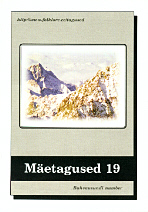Aranda usundilistest kujutelmadest
On the religious concepts of the Aranda
Author(s): Mihkel NiglasSubject(s): Christian Theology and Religion
Published by: Eesti Kirjandusmuuseum
Summary/Abstract: The Aranda tribe living in central Australia is one of the biggest and best studied. Relatively much is known of their cosmogony, anthropology and reincarnation concepts, while little is known about what specific people believed. Some of the first researchers were W. B. Spencer and F. J. Gillen (who coined the term dream time) and father and son C. Strehlow and T. G. H. Strehlow (who contradicted the belief that the Aranda people are homogenous and explained that the term dream time is a mistranslation of mythical time and prehistoric eternity). One of the main difficulties with studying Aranda culture derives from the fact that the material was collected by amateurs. Another difficulty lies in the fact that the more significant religious heritage, songs and ceremonies were secret, not publicly displayed. A problem is also the totemic terminology of the researchers who all implicitly presumed the existence of a totemism. C. Strehlow used the term totemic gods for mythical beings, but sporadically also dubbed them (synonymically) totemic ancestors. T. G. H. Strehlow's terms are totemic ancestors, ancestors and supernatural beings, A. P. Eikin's totem heroes, Wilpert's cultural heroes, etc. The article concerns the cosmogonic, anthropological and reincarnation concepts of the Aranda.
Journal: Mäetagused. Hüperajakiri
- Issue Year: 2002
- Issue No: 19
- Page Range: 56-80
- Page Count: 25
- Language: Estonian

